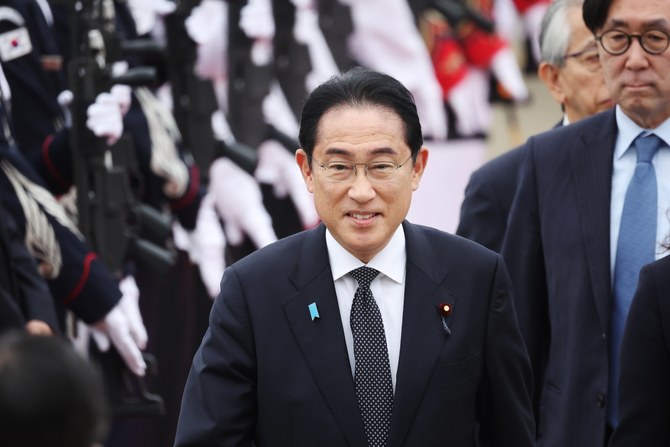
- ARAB NEWS
- 13 Jul 2025

The relationship between France and Germany offers important lessons for Japan and South Korea as they navigate their historical grievances and strive to strengthen regional ties. Indeed, France and Germany’s journey toward reconciliation provides valuable insights. The two European countries went from being consistent and ruthless enemies to becoming the engine of European construction.
France and Prussia/Germany faced each other in a total of seven wars in the 18th and 19th centuries, including the Franco-Prussian War and the Napoleonic Wars. Then, the 20th century witnessed the horrors of the First World War and the Second World War. These conflicts were driven by a combination of territorial disputes, such as for the Alsace-Lorraine region, national ambitions and ideological differences. They resulted in immense human suffering, loss of life and significant geopolitical changes.
However, the post-Second World War era, with the important role of the transatlantic alliance, has witnessed a remarkable transformation in the relationship between France and Germany — initially as West Germany and then as a reunified country. They have worked toward reconciliation, cooperation and the establishment of a united Europe.
The relationship between French President Charles de Gaulle and West German Chancellor Konrad Adenauer was the cornerstone of this new era. It underwent a remarkable evolution and played a crucial role in shaping the future of both Franco-German relations and European integration. At their first meeting in Colombey-les-Deux-Eglises in 1958, the relationship was marked by a degree of skepticism and caution. De Gaulle was concerned about German power and sovereignty. Adenauer, on the other hand, sought to rebuild Germany’s reputation and establish strong ties with its Western neighbors.
Kishida’s visit carried a powerful symbolism reminiscent of the iconic moment when Mitterrand and Kohl held hands
Khaled Abou Zahr
However, as time passed, the two leaders developed a deep mutual respect and understanding. They recognized the shared interests and benefits of Franco-German cooperation, particularly in the face of the Cold War and the desire for European integration. Their joint commitment to overcoming the past and fostering reconciliation was epitomized by the historic meeting at the Elysee Palace in 1962, which solidified the foundations of a close partnership. The relationship between De Gaulle and Adenauer laid the groundwork for the Franco-German alliance and set a precedent for future generations of leaders, who would build upon their legacy to forge a united and prosperous Europe.
More than two decades later, in 1984, the iconic image of Francois Mitterrand and Helmut Kohl holding hands at the site of the Battle of Verdun became another significant symbol of Franco-German reconciliation. The Battle of Verdun, which took place during the First World War, remains a symbol of the horrors of trench warfare. It was fought between the German and French armies and resulted in a staggering loss of life. Hence, this powerful gesture represented a deep commitment to peace and symbolized the overcoming of historical animosities. It showcased the transformative power of personal relationships between leaders and the ability to set aside past conflicts for the greater good.
With the end of the Cold War, Germany started its reunification process in 1989. And the Franco-German friendship grew ever stronger within the construction of the EU, which was founded in 1993.
In a remarkable development this week, Japanese Prime Minister Fumio Kishida made a reciprocal visit to South Korea, where he expressed genuine empathy for the victims of colonial rule. This visit carried a powerful symbolism reminiscent of the iconic moment when Mitterrand and Kohl held hands. It signifies the potential for a new era in relations between these two Asian countries. This is especially important as they face shared regional challenges, such as China’s growing influence and the persistent issue of a nuclear North Korea. Strong personal relationships and dialogue are the foundation for a more robust and harmonious future. Both Japan and South Korea are strategic partners within the NATO framework, emphasizing the significance of their role in regional stability and global security.
Strong personal relationships and dialogue are the foundation for a more robust and harmonious future
Khaled Abou Zahr
While the Franco-German experience serves as a good example, it is worth noting that, with the rise in geopolitical and military challenges, as well as renewed ideological debates, relations between Paris and Berlin have not been without their challenges. Tensions have arisen on various issues, including economic policies, energy, European integration and defense. They stand at a decisive and dangerous moment in the future integrity of Europe. Nonetheless, the lessons learned from their shared history and commitment to work through their differences have enabled them to maintain a strong partnership within the framework of the EU and NATO.
The Japanese PM’s visit to South Korea presented an opportunity for both countries to embark on a new chapter in their relationship and foster a transformative moment, similar to that witnessed between France and Germany. This can lead to a broader unity among Asian countries, just like it did for Europe. While challenges may arise, the commitment to reconciliation and the pursuit of common interests can pave the way for a more peaceful and prosperous future.
The lessons that Japan and South Korea can draw from France and Germany’s experiences are of paramount importance. Yet, we should remember that nothing is written in stone and alliances, more than anything else, demand consistent hard work, communications and an alignment of interests. They sometimes demand putting a supranational interest above anything else. The goodwill between their leaders presents an opportunity for both countries to embark on a new chapter and foster a transformative moment, in which they take greater control in deciding the future path for their countries and invite others to join them as they seek to strengthen regional partnerships and ensure a more stable and prosperous Asia.